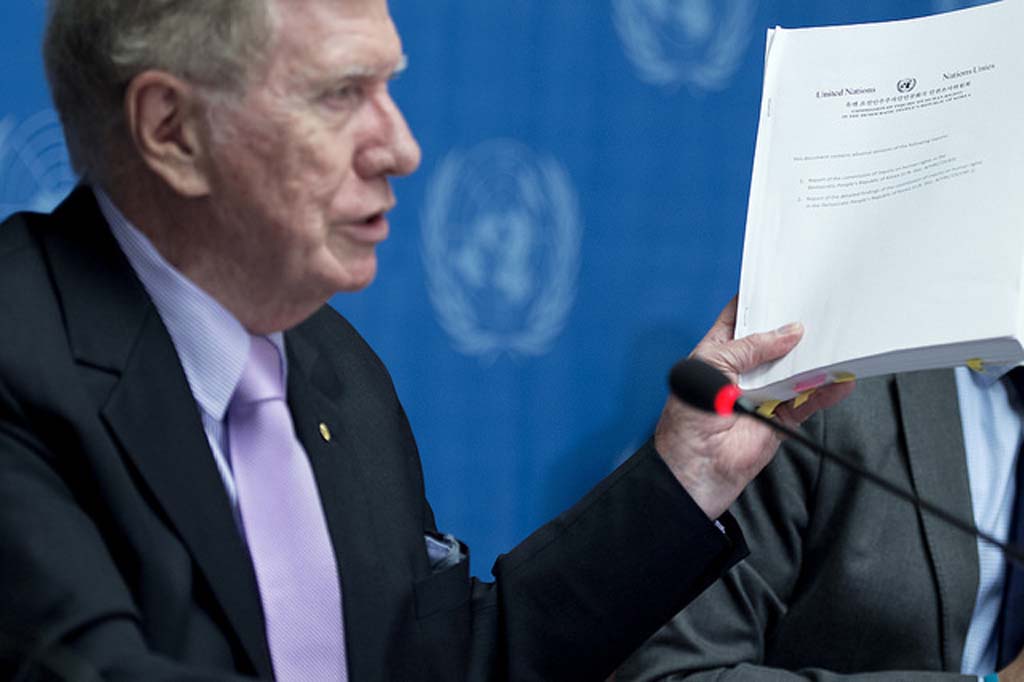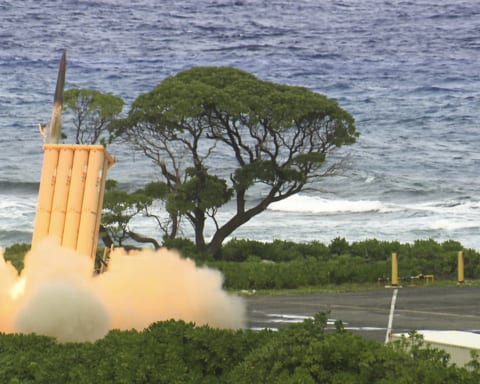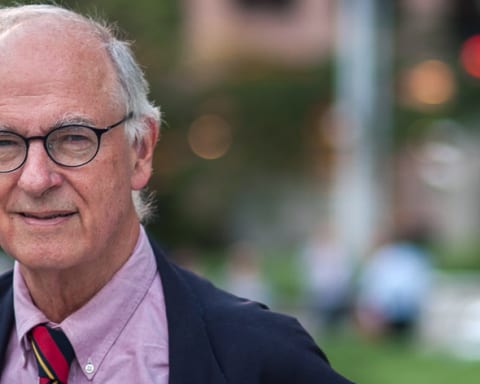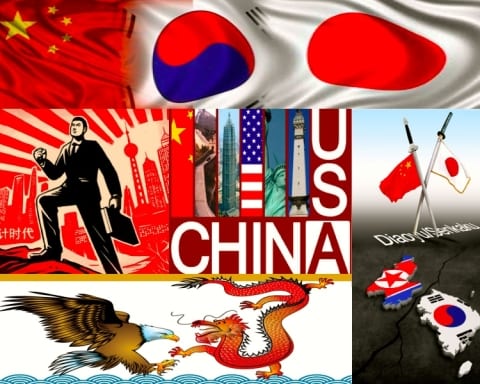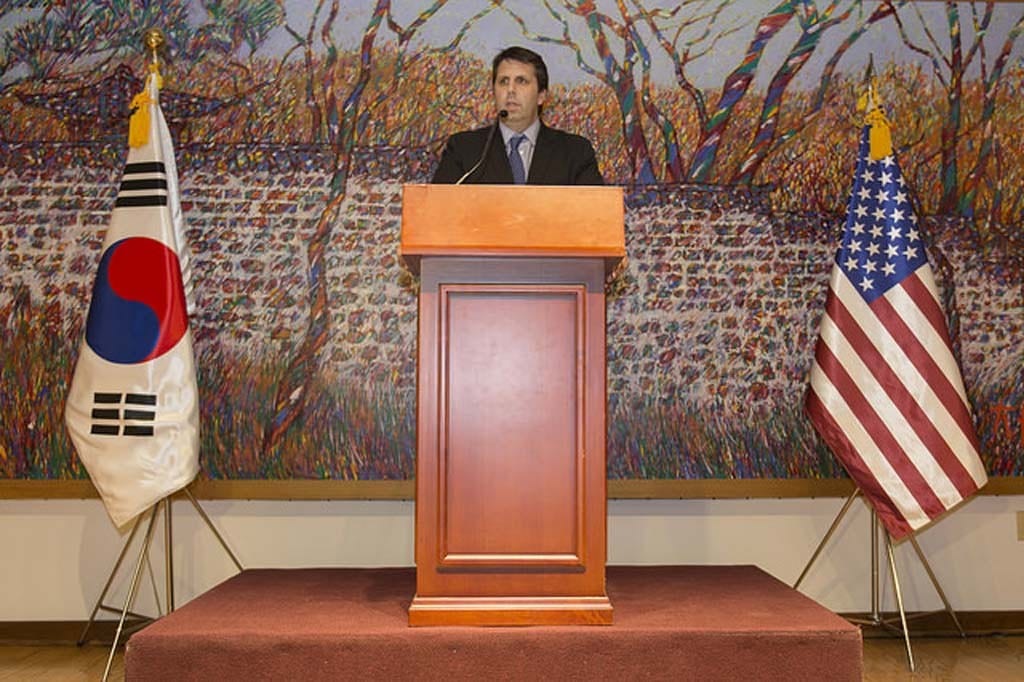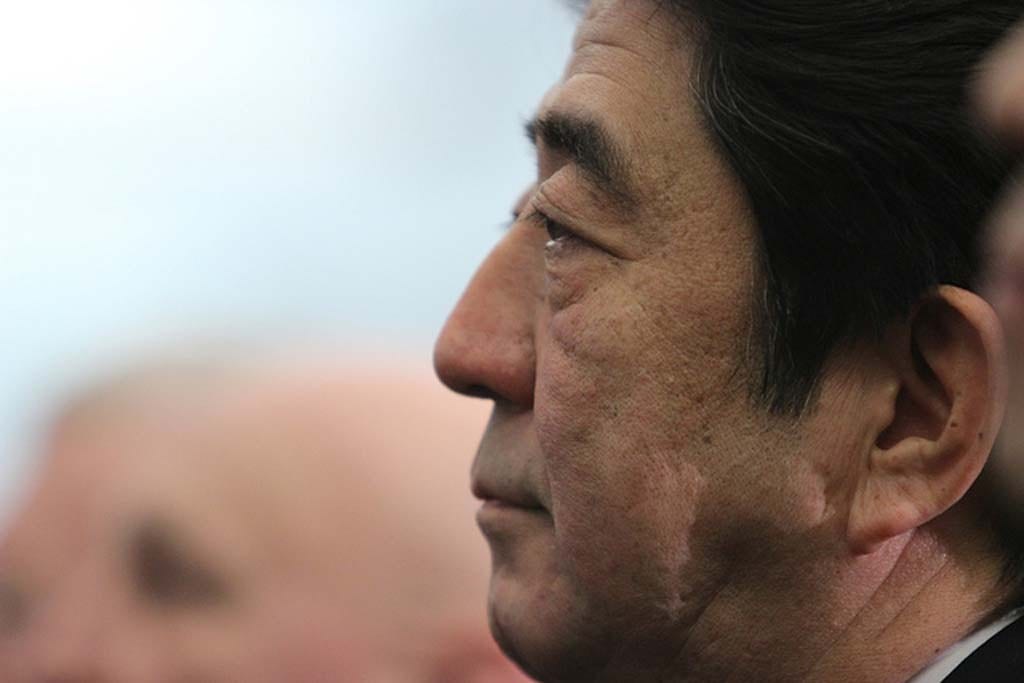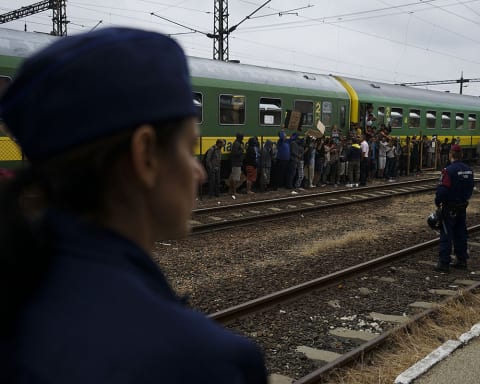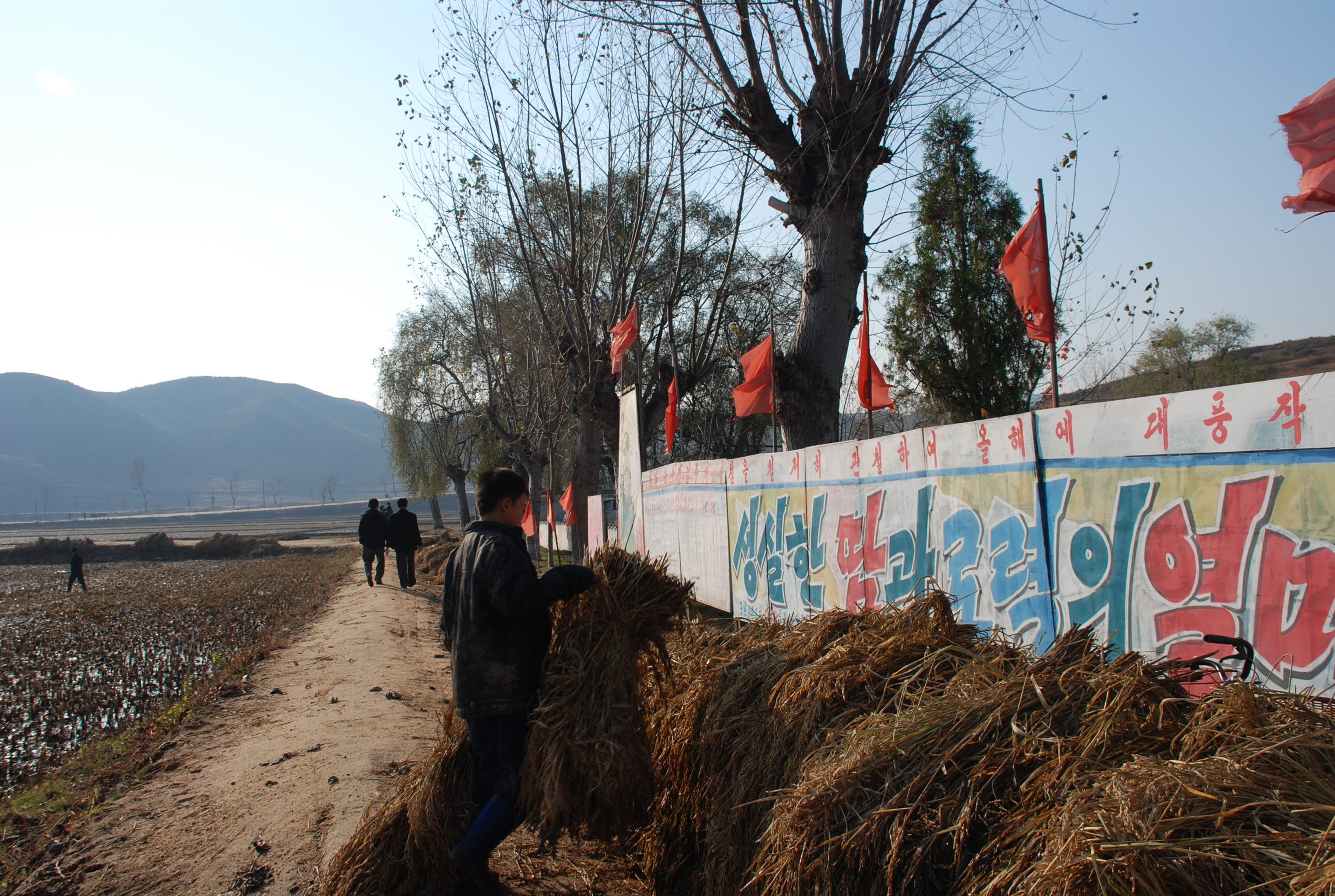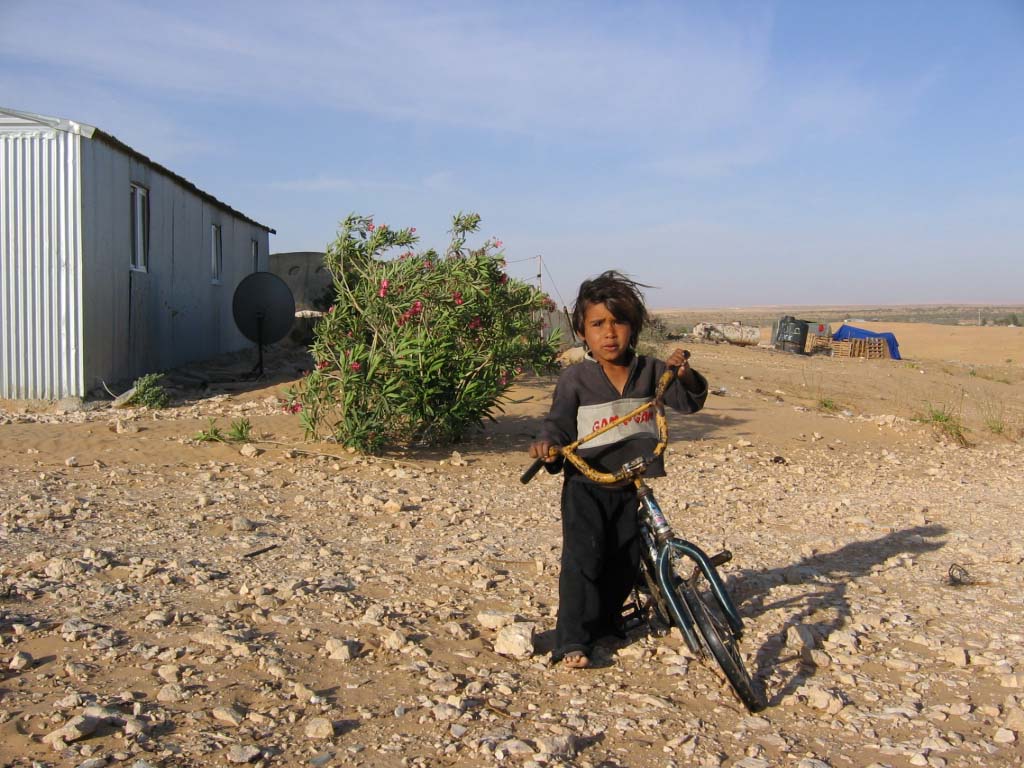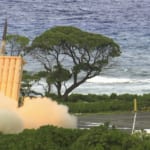Note: The following interview was published in the Yonsei Journal of International Studies Vol. 6 Issue 2 and can be found online at their site. The Commission’s full report can be found at the Office of the High Commissioner for Human Rights.
A NEEDED INQUIRY
Interview with The Hon Michael Kirby AC CMG
Chair of the Commission of Inquiry on Human Rights in the Democratic People’s Republic of Korea
Established in 2013 by the United Nations Human Rights Council, the Commission of Inquiry (COI) on Human Rights in the Democratic People’s Republic of Korea has provided new and valuable information to those concerned with the situation inside North Korea. Through the conducting of public hearings in Seoul, Tokyo, London and Washington D.C., the commission collected information and released a report in February 2014 which detailed many crimes that had occurred within North Korea, including crimes against humanity. The Hon Michael Kirby, former Justice of the High Court of Australia, was appointed to lead this inquiry. During a recent visit to Yonsei University in Seoul, Editor in Chief Eric Watson was able to interview The Hon Michael Kirby.
Eric Watson: How did you become involved with the commission?
Michael Kirby: I was at a conference of statisticians in England. I was asked if I would allow my name to go forward to become a member of the commission. After reflecting on this with my partner I agreed and a few weeks later I was notified to this commission as a chair. I suspected the background to it was my earlier work in the 1990s as special representative to the secretary general of the United Nations for Human Rights in Cambodia. That was dealing with human rights in a very vulnerable country at a vulnerable time with respect to the Khmer Rouge regime. I believe that this may have influenced the decision of the United Nations human rights council and the high commission for human rights to advance my name.
Eric Watson: Had the previous work in Cambodia benefited you during your work with this commission?
Michael Kirby: Yes it had. As I was the special representative of the secretary general my job was to go on mission to Cambodia to investigate aspects of human rights in the country, to express the good and the bad that was happening, to report them to the human rights commission as it then was in Geneva and the third committee of the general assembly in New York. It therefore gave me experience in the UN special procedures, specifically special procedures for human rights. I also insisted that I take a very active part in the writing of the reports as the special representative. In fact, I wrote all of the reports as a special representative. This was not feasible in the case of the DPRK report, but I weighed every word in the draft and made many suggestions and substantially the report reflects the input of the commissioners. It is not a bureaucratic report that has been written by others, into which the commissioners had little say. In fact, all of us contributed significantly to the style and content of the report. I believe the report on the DPRK is one of the most readable reports of the UN in recent years.
Eric Watson: Certainly it is extremely readable, and I believe you mentioned cutting down some parts to make it that way. However, it still remains very strategic in its use of language.
Michael Kirby: Related to that is the fact that we used the quotations from the transcript of the witnesses’ oral testimony to the COI, which means that the report has a great vividness. It speaks in a very direct way from the viewpoint of the witnesses. It tells the stories of human rights deprivation and the nine headings of the mandate of the COI. All of this adds to the sharp- ness and readability of the reports contents.
Eric Watson: In creating the mandate, what was the process to decide these nine headings and the scope of the COI?
Michael Kirby: The mandate had been decided before I was appointed and was determined by the Human Rights Council. I believe it grew out of the debates between the supporting member countries and the international civil society organization that were active proponents of the creation of a special COI. These international organizations included Human Rights Watch, Amnesty International, the International Commission of Jurists, and other international bodies based in Geneva that work around and with the members of the human rights council.
Eric Watson: How did your previous impression and knowledge of North Korea and its regime impact you during your work?
Michael Kirby: I had no great knowledge of North Korea beyond the knowledge of an informed layperson who reads the Economist and is therefore kept up to date with developments in North Korea, but not as a specialist. I could therefore approach the North Korea investigation in a highly professional way as a person who had spent 34 years as a judge, investigating a whole multitude of issues both big and small, at different levels. It was good training for report writing and for the analysis of issues. People ask me, “How was I able to cope with the stress of the Human Rights stories that were told to us by witnesses?” To be completely honest, I didn’t find it that difficult because for most of my life I had been dealing with stories of many wrongs that had been done by one person to another or one institution to another. Therefore, it takes a lot to cause emotion, in a raw kind, on the part of a person like me. In that sense, coming to the issue of North Korea as a person, not an expert, as a person who has professionally for decades been analyzing problems I was able to address the issues of North Korea with a great degree of dispassion. I did not approach it with hostility to North Korea. I did not know enough about North Korea to feel hostile toward the regime. I had curiosity. Even at the end of the inquiry I did not have hostility to North Korea, I just reported the human rights abuses that had been described and that this commission had found had occurred. This was exactly what we were asked to do.
Eric Watson: This use of testimonies is unique. What was the motivation to make these testimonies public and to host them online for viewing?
Michael Kirby: First of all, my experience was in a common law country. In such countries, it is common that these inquiries are held in public. This may be an aspect of general attitudes to transparency or it may be simply a long tradition that has been followed. It does tend to add to cost and time, but it serves a role as an educational process for the community involved. It also allows those making the decisions to be themselves the subject of judgment and scrutiny. There was an additional consideration in the case of North Korea. They did not permit the COI to enter the country despite the resolution established by the Human Rights Council that urged them to cooperate. Therefore, we had the risk that our inquiry would be disrespected because we were not able to enter North Korea. The way to resolve that risk was to ensure that we proceeded in a fair process and that a wide audience could scrutinize the witnesses. Since there is not a wider audience than those that have access to the Internet, we decided it was useful and wise in the circumstances to put the testimony online. This was as long as the witnesses consented and that we judged that there was no risk to them or their families in North Korea. I believe that our decision was vindicated and that the process of the public hearings was a definite plus to methodology of the COI. I believe it is also likely that in the future the UN COI’s will in many cases be conducted in public. It fulfills the information gathering purpose, it stimulates interest, it raises expectations that something will be done, and finally it is more transparent and therefore a more modern way in which to gather evidence.
Eric Watson: In post-apartheid South Africa there was a truth and reconciliation commission. It has been noted that some of those who had been victimized found in a sort of healing or redemptive quality to the public hearings and discussions. Did you find any sort of similar comments from those who gave testimonies? What was the general feeling from some of those who gave testimonies?
Michael Kirby: In a rather formal way, we did not have a lot of contact with the witnesses outside the hearing room of the commission. Therefore, I haven’t had the benefit of reflection by them on their experience from their point of view. Perhaps this displays the attitude of someone who worked for 34 years as a judge. I didn’t tend to meet people before or after they gave testimony. There is an element of remove and independence from the witnesses. We were not working closely with civil society organization. We simply heard the testimony, analyzed it, and then reported on it. It will fall to others to talk to the witnesses and see if it found it redemptive. What was most striking about the witnesses was that like a lot of holocaust witnesses, they gave their testimony in a very low-key, matter of fact way. They did not appear, with perhaps one or two exceptions, emotionally charged or furious or hostile with the DPRK. They were simply recounting some horrible experiences in their life, and on the whole doing so in a very restrained way. Sometimes they would acknowledge aspects of life in North Korea that were favorable to North Korea. This helped to accept his or her testimony, as someone who is simply a hostile witness normally wouldn’t do this.
Eric Watson: In the report, there was an intentional distinction between crimes against humanity and genocide. The commission stopped short of saying this was genocide, but noted that there were grounds for further investigation. What was the thought process behind this?
Michael Kirby: This can be found in the report. The commission was not entitled to decide that genocide had been proved without regard to the technical definition of genocide in international law. The Genocide Convention substantially provides that technical definition. The genocide convention was negotiated in the immediate aftermath of the Second World War and therefore reflected the concerns of genocide that had came to the fore after 1945. Those concerns related mostly, but not only, to the Jewish population that had been exterminated in concentration camps established by the Nazi regimes in the occupied territories of Europe. Therefore, the Genocide Convention defines genocide as the extermination of a population or part of a population by state policy with reference to the ethnicity, nationality, race, or religion of the group in question. In the case of the DPRK, the main rea- son between the extermination of portions of the population of North Korea was not race or religion. It was rather, actual or presumed, hostility to the politics of the regime. Therefore, the grounds of the violent killing of portions of the population did not fit comfortably into the definition of genocide as expressed in the Genocide Convention.
A question then arose as to whether the commission of inquiry should consider that the modern definition of genocide had expanded somewhat form the definition in 1948 in the Genocide Convention. There were arguments both ways on this issue. On the one hand, the convention is a very important document. Genocide is an extremely significant international crime and therefore it should advance to a more modern appreciation to include political genocide. On balance, the COI considered that it should adhere to the Genocide Convention definition, subject to one matter that I will mention. It therefore concluded that genocide could not be found, at least not found on the standard of proof that was accepted by the COI. Namely, the standard of proof that the presence of reasonable grounds for concluding the crime had been made out by the testimony.
There was one subordinate question that arose, which arose out of the fact that a portion of the population had been radically reduced by a reference to religion. The Christian population of North Korea at the time of partition was approximately 24 percent, roughly the same percent as the current Christian population of South Korea. At the time of the commissions report, according to the statistics of the DPRK, the Christian population is at 0.8 percent. The question arose as to whether this was due to extermina- tion or due to the discouragement of religion by communist ideology, which declares that religion is the “opiate of the people”. In other words, some- thing into which people are seduced. This is of course not rational. As we could not definitely decide this question and did not feel we had reasonable ground in favor of finding genocide we ultimately concluded that genocide should not be found by the COI. Additionally we had consulted international scholars, including William Schabas, who is a world scholar on the issues of crimes against humanity and genocide. The important point he made to us was the we should not look to genocide as the international crime equal to the “gold standard”, feeling that in someway we had fallen short of the most serious international crime because we could not find genocide as an established crime in the case of North Korea. He points out that crimes against humanity are themselves extremely serious international crimes and therefore there should be no feeling of any obligation to press further to an equally serious crime of genocide. That being the case, we did not have to press our conclusion that the crime of genocide had perhaps advanced beyond the definition of the Genocide Convention. It was enough to find that crimes against humanity, which we did, and that is where we left the matter.
We did indicate however, that the opinions of the three commissioners, that genocide might have indeed advanced to include political genocide. That is a matter that should have further consideration by the international community. International crimes can expand in content; however, great care must be adopted in a very serious crime like genocide. This is so you do not push it beyond which it can legitimately carry.
Eric Watson: What do you hope this report provides for those working on the human rights situation in North Korea?
Michael Kirby: First and foremost it gives a voice to the victims and people who have been found to be probable victims of very serious crimes against human rights or crimes against humanity. Second, it gives respect to the international human rights organizations which have been supporting and listening to those victims and vindicates their efforts over the years. Third, it compresses into one document a huge amount of knowledge and expertise that has been compressed to about 400 pages. People spend their whole lives studying North Korea, and most people do not have time to consider every aspect of the crimes in North Korea. Now, in a relatively short space, there is a complete review of the crimes that we have found on the nine headings that were provided by the Human Rights Council to the commission. Therefore, the greatest value is that it brings knowledge in a com- pressed form of a very wide range of crimes, and a huge amount of information to a very large audience. It is available online, the public hearings are online, as are the transcripts in multiple languages including Korean. The challenge now is to get the report and the background information into the hands of people in North Korea. The people of North Korea have a right to know what the United Nations has found in respect to human rights in their country. The government of North Korea should make that available to them. The commission constantly requested access to North Korea and has indicated it has prepared to go to North Korea to justify this to the regime and to answer questions. So far, that invitation has not been taken up but the offer still stands.
Eric Watson: We know that China has in instances opposed sanctions against North Korea. Do you feel that this report will put pressure on China and its use of veto power in the Security Council?
Michael Kirby: China is very prudent in its use of veto power given to it as one of the five permanent members of the Security Council under the charter. In the whole history of the occupation of the China Sea by the PRC, China has only used the veto ten times. Including in the most recent instance of the suggestion that Syria should be referred to the International Criminal Court. That is a very small number in contrast to the Russian Federation and the US, which has used the veto power many more times. So, it can’t be assumed that China will use its veto power, and in any case it is a decision China will have to make. It will have to face the people of the world and the pages of history. Already in blogs in China, in the new openness of China, are beginning to ask why their government is not supporting the actions of the UN in respect to the horrible acts reported on the part of North Korea. It is a question of China’s assessment of itself and of China’s assessment of its role as a permanent member of the Security Council. It is one of the coun- tries with the gateway keys to the responsibility to protect. The responsibility to protect exists in international law, at least in cases where the crimes are crimes against humanity or genocide, and the country concerned will not protect its citizens, such as North Korea.
Eric Watson: One of the findings was the poor welfare of children, specifically those that participate in the mass games that are a tourist draw in North Korea. What is your personal opinion of tourism toward the DPRK?
Michael Kirby: On the whole, I think tourism is a contribution to human peace and human rights. Many countries try to control what tourists do and where they go. No country is as emphatic in its control as North Korea. Therefore people who go to North Korea have to understand that they are going to a country where they will not be able to just wander around and visit where they would like to. They will be under the control of their guardians who watch their every move and ensure that they do not make contact with ordinary Korean people. It is not really tourism, as we would normally understand the word. I believe the mass games stand as a case apart. We found evidence that the children that participate in the mass games do so at the expense of their education. They are taken from their classes, they have to endure extremely long hours often in harsh weather conditions, all for a relatively short time of glorifying the regime and its supreme leader and the supreme leaders family. For my part, I can see some reasons as to why people would visit North Korea as a tourist. It would give them some idea, and perhaps some opportunities to express their beliefs, and express the solidarity of the international community. But, at the moment, I do not think I would visit the mass games. They might have magnificent choreography, but so were the Nazi parades. It isn’t an attribute of a free society to have thousands of people and thousands of school children engaged in a mindless set of exercises where the only beauty of it is that they are all in locked step doing the bidding of the supreme leader.
Eric Watson: During your time in Seoul, you met with researchers and public officials. What have been the responses from these individuals when discussing this report with you?
Michael Kirby: I think there is a lot of understanding of the report and of the report’s addressing, acknowledging, and condemning of the human rights abuses in North Korea. There is an anxiety in South Korea as to whether such condemnations will set back the cause of unification. There is a feeling in South Korea that many of the problems of North Korea will be solved only if the two Koreas can be united. After all, they were united for thousands of years before a line on a map divided them artificially. To say, not by the will of the Korean people. So there is an understanding of the need to identify human rights abuses, but there is also an anxiety. That conflict within South Korea is symptomatic of political dividedness in the political landscape of South Korea. It is a difficult issue, but it is important to realize that no reconciliation and reunification can in practical terms be secured, accepting the terms of North Korea, unless there is a foundation of truth. That is, unless there is a foundation of description of serious international crimes and the acknowledgement of those crimes, and the accountability of at least those who are most to blame for them. Without that foundation, any form of unification would be extremely fragile because it would be built on thin ice.
Eric Watson: Do you have any comments for citizens of the world now that these testimonies and report are public? What would action would you like to see happen?
Michael Kirby: First, I hope that the commission’s report does not simply gather dust as is often the case with UN reports. Second, I hope that the momentum that has been built up by very widespread publicity of the re- port will continue. North Korea has been an expert at avoiding publicity of their wrongs and it is important that the world knows, and addresses these wrongs that have occurred over decades to the people of North Korea. Third, I hope that the field office that will be created in South Korea will become a place where victims can go and have their stories recorded. Hopefully these stories will become in due course possibly part of the brief for the prosecutorial services of the ICC or other judicial tribunals, and certainly for the history of the Korea people it is important that this chapter is recorded and kept for posterity. Only those who recall and learn from the lessons of history will avoid repeating them. Finally, I hope that the case of North Korea will once again illustrate the importance of universal human rights. The ambassador for North Korea said that they have a saying in Korea, “mind your own business”. Human rights are the business of the whole world, and it is important that we constantly acknowledge that and renew our conviction. We must do something when we are informed of serious crimes, particularly crimes against humanity and genocide.
